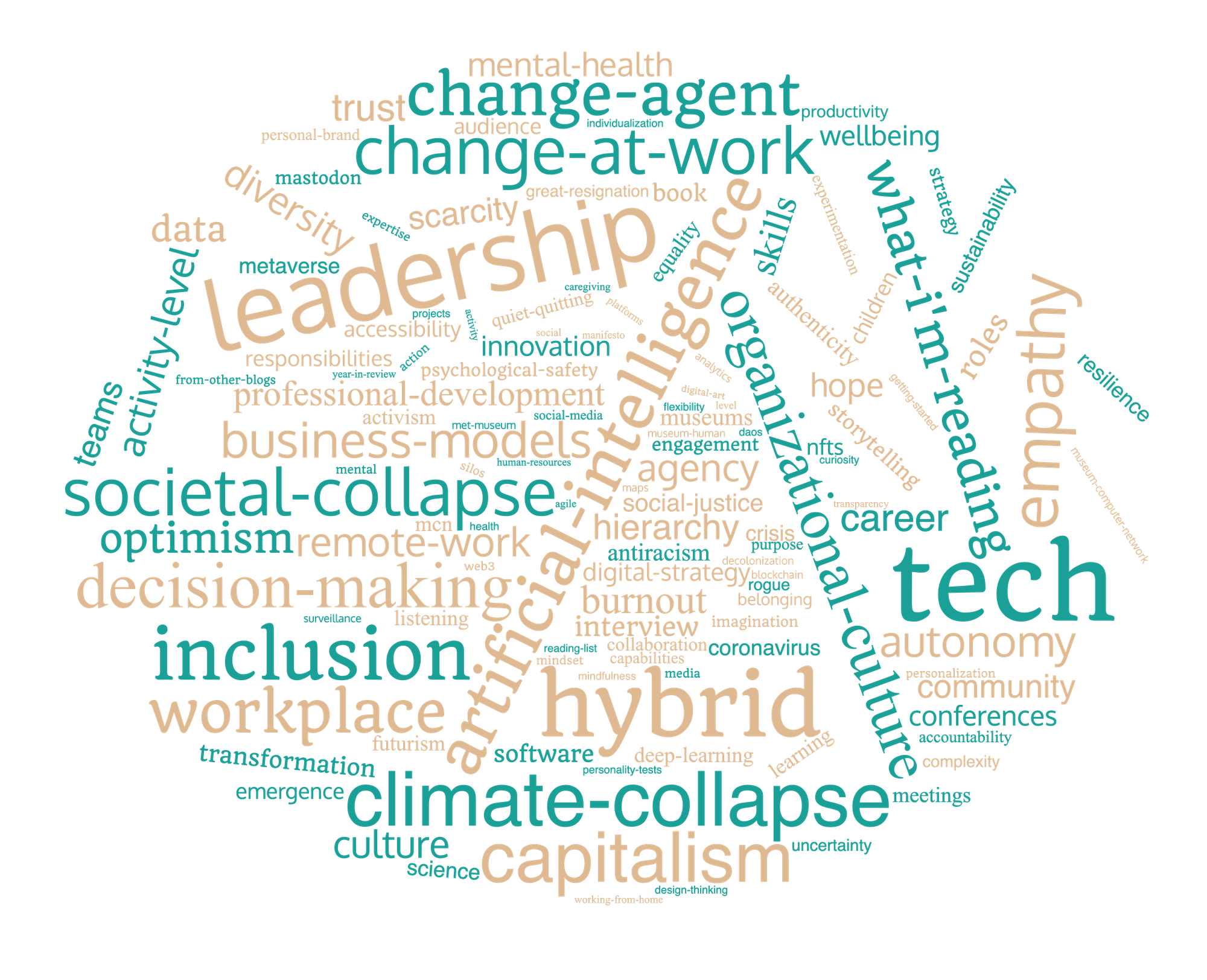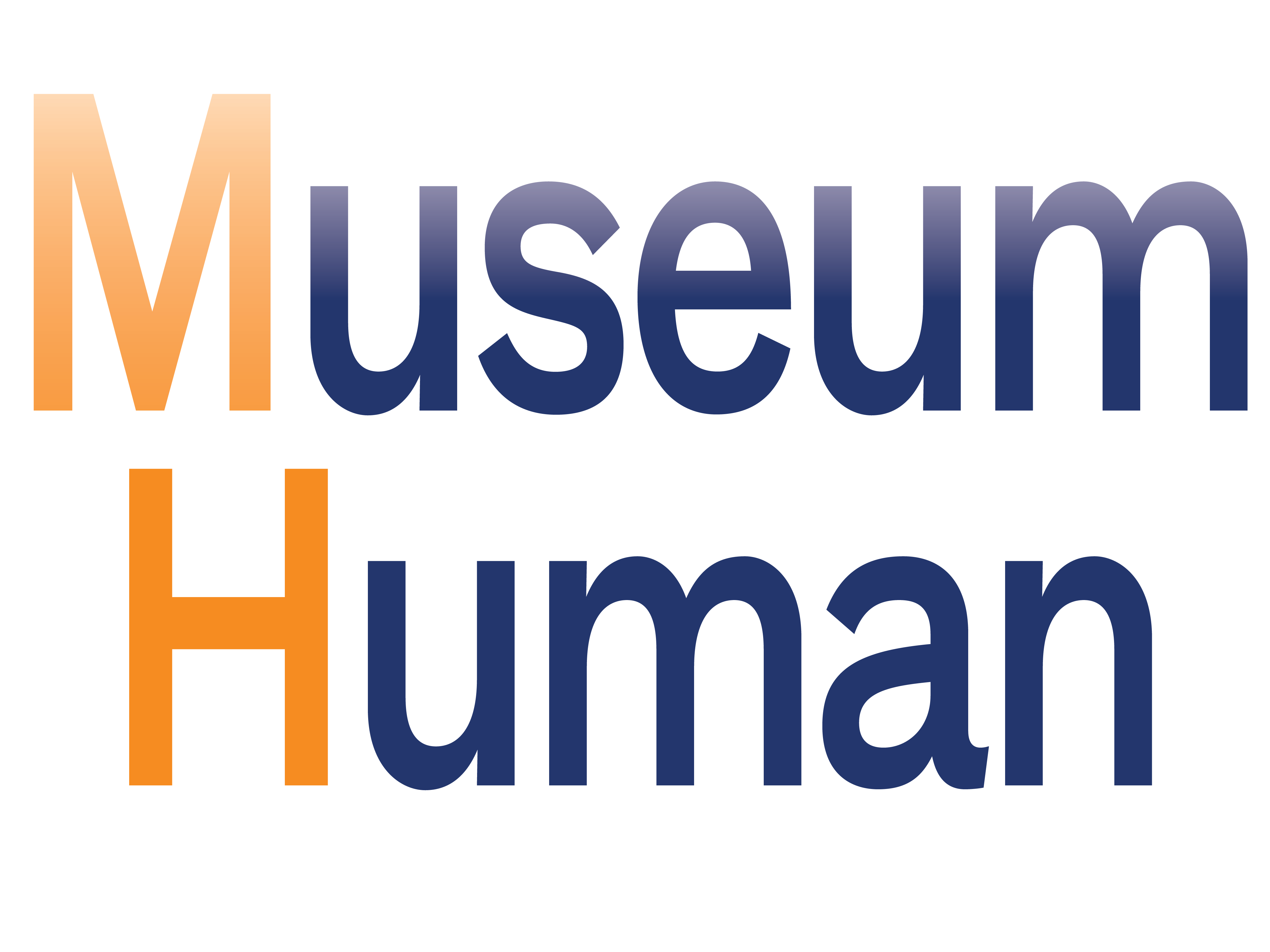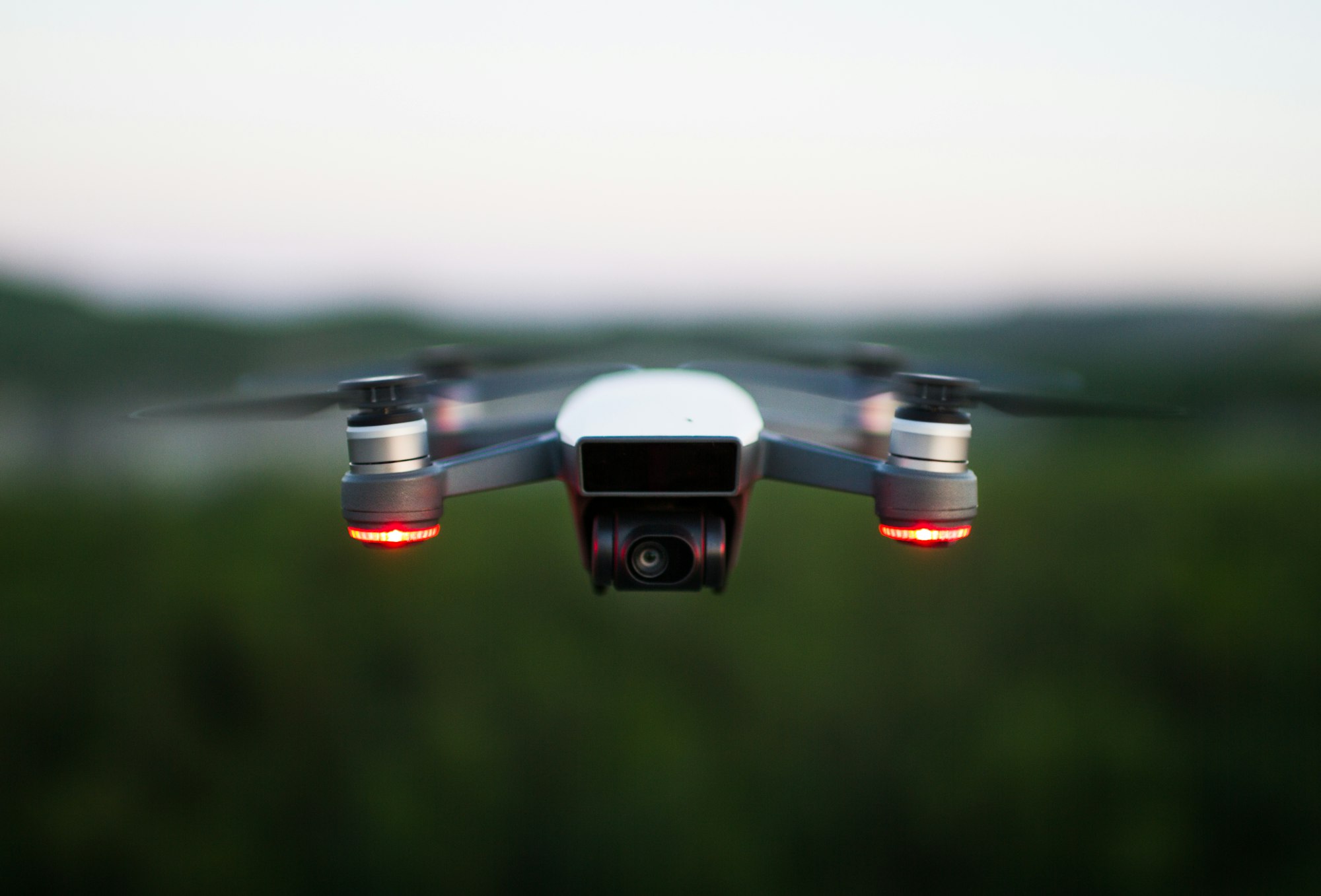
What did readers get in 105 posts of Museum Human this year?
Tagging is an imperfect practice, especially for someone as forgetful as I can be, but here's a word cloud of the tags from the year's posts. (Note that hyphens are used to group multi-word tags, and the tag "Links of the Week" has been excluded.)

Now this free tool isn't perfect, as longer words are shrunk for size consideration (for instance, "hybrid" appears much larger than "remote work" even though the former was only tagged once more than the latter.) It shouldn't be surprising that "artificial intelligence" took up the middle position, and "tech" has a prominent place. Both kinds of "collapse," "climate" and "societal," loom large, as does "hybrid." But I want to point out the size of "leadership." Because, to me, AI is as much about leadership as it is about technology.
If there was a throughline for 2023, at least to me, it was how the worker-centered discussions of remote and hybrid work/quiet quitting/Great Resignation were pre-empted by the institutional and corporate focus on AI. It's almost as if organizational leadership, unable to control the conversation when it comes to workplace flexibility, found something else that they could control in the institution-scale application of generative AI and large language models.
Do I think there was a grand conspiracy, or even a conscious desire to do this? Not necessarily, though not all conspiracies need to be conscious. Organizations functioning in capitalism are always going to synthesize worker needs into larger priorities; it's the lesson we've been learning since the time of the Luddites in the early 19th century.
Museum organizations, using the tool of continuing obsessions with productivity and overstuffed activity levels in the name of audience growth, always find ways to take agency and autonomy out of workers' hands. AI could be an instance of empowering workers by letting them drive conversation and innovation (also here). What could we all do with AI? How should we apply it? What should we do to not only protect jobs but transform them? When will workers have the time to do this? Who gets to decide if AI is the solution or if our problems are best solved by other means? Where in the org chart does this responsibility and accountability lie?
The questions are legion, but only a few teams in an organization are getting to ask them. Leaders aren't modeling helpful practices because, in the end, it's still all about more: exhibitions, acquisitions, programs, and audiences.
Hovering over all of this is the specter of collapse, as conversations about the climate have given way to more profound discussions about society. In a sense, the long-term organizational refusal to slow down and focus on people, not growth, has turbocharged collapse. Shifting energy and work using technology just rearranges the deck chairs on the sinking ship.
The need for personal user guides—to communicate our preferences, needs, personalities, and, in a sense, our traumas—reflects how workers' essences have never had a place in organizational conversations about productivity, growth, and activity. We've moved past burnout as individuals to needing to understand the burnout of our teams, groups, organizations, fields, and societies.
Increased unionization is one reflection of workers recognizing this, especially as our supposed economic good news (at least in the US) ignores how difficult it is to make ends meet now and in the future. Even those who have a decent financial situation today know that they might be one medical crisis, job loss, education expense, or housing crunch away from having to retrench, move back in with parents (unless they're already providing caregiving), or face ruin.
A progressive yet elite field like the cultural sector isn't exempt from problems with no short-term fix, like ABIDE, migration, or the war in Israel and Gaza. These have more in common than you might think; the majority of museum workers think of themselves as good people who want good things for others but are forced by scarcity and precarity to hoard what they can, avoid picturing a more equal future that holds less individual achievement and reward for them, and eventually just shrug it all off. What can I do? The world is unfair. I have a lot of privilege, but I have to provide for myself and my family first. And I'm tired.
And yet … the way through is acknowledging this trauma. Museums as organizations and leaders as leaders need to recognize this first of all. Workers need to fight for autonomy and, most of all, a slowing down of the relentless pace of museum work. AI is only the latest example of this growth-at-all-costs program.
Something will take its place, whether climate or war or something unforeseen (or unacknowledged). The backlash against identity shows how far the dominant culture—on every scale—will go to protect itself against acknowledging our collective situation. Many museum workers have done so, but the need for insulation against reality is a strong one and deeply entrenched.
It won't go without a fight, as evident in the return-to-normal-at-all-costs attitude so prevalent in society and our field. I don't like to play the conference and gathering killjoy, especially as it's a thankless and unpopular position, and one that I'm sure costs me readers over time. But I'm firmly aligned with the "doomer" (or as I like to call it, "realist") position on covid and public health and welfare, that we've abandoned the latter in our desperate desire for in-person activity, our brief organizational dalliance with respecting the disabled, neuroatypical, introverted, and marginalized in our workplaces largely forgotten. Even worse, the people who identify this new reality are labeled—or encouraged to self-label, see above—as killjoys and human-warmth-hating scardey-cats, as if acknowledging that long covid is a not just a summer flu is tantamount to treason in the elite cultural sector.
That's why the doomer label—which I've tried to own, publicize, and even celebrate—is such a target. Our growth- and achievement-obsessed society can't handle the fact that a global disaster will almost by definition impact the opportunities and mental health of most people. In a passion-driven field like museums, we don't easily accept the idea that we, as individuals, can't succeed in our current situation by simply working harder, hiring more perfectionists, or hacking our processes with new processes.
We need to imagine new models. We need to visualize new structures. We need to forge new senses of time. We need to fight for new organizations. We need to center new voices. We need to slough off our egoist armor. We need to confront who we have been and who we are now and struggle for who we can be. We need to question the work.
So call that my version of Museum Human's story for 2023. It all ties together—another part of MH's narrative.
Next week, you'll read about how this might play out in 2024. As I've mentioned, while it's been fun to produce two posts a week every week of the year, I'm not sure that this pace by itself serves the blog's readers the best that it can. I'd like to take a little of my own advice and try to slow down while producing more profound and useful content that continues the blog's voice and brings in new perspectives. This doesn't necessarily mean that the number of posts will go down, just that there might be some more variety along the way.
Thank you again for reading! On Friday you'll get the final Links of the Week for 2023, though digging through the pile will continue into the first week of 2024.
cover image by Ghana Shyam Khadka / Unsplash [description: a large spider on the end of a cut bamboo stick]
The Top Museum Human Themes of 2023 © 2023 by Robert J Weisberg is licensed under CC BY-NC-ND 4.0






